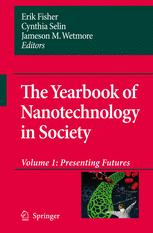

Most ebook files are in PDF format, so you can easily read them using various software such as Foxit Reader or directly on the Google Chrome browser.
Some ebook files are released by publishers in other formats such as .awz, .mobi, .epub, .fb2, etc. You may need to install specific software to read these formats on mobile/PC, such as Calibre.
Please read the tutorial at this link: https://ebookbell.com/faq
We offer FREE conversion to the popular formats you request; however, this may take some time. Therefore, right after payment, please email us, and we will try to provide the service as quickly as possible.
For some exceptional file formats or broken links (if any), please refrain from opening any disputes. Instead, email us first, and we will try to assist within a maximum of 6 hours.
EbookBell Team

0.0
0 reviewsThe ideas and imagery about the future that characterize nanotechnology today are shaped by multiple values and agendas which influence public investments,business strategies, infrastructure design, and public debate. Presenting Futures highlights a variety of ways that nanotechnology actors think about and seek to shape the future. It brings together social scientists, humanists, government officials, activist groups, designers, and public relations professionals into a multifaceted and at times conflicting dialogue through press releases, government reports, and advertisements taken from the front lines of the political discourse over nanotechnology, as well as original writings that situate nanotechnological futures within broader contexts. The chapters in this volume document various approaches to the future and how contemporary cultural conceptions about science, technology, and society are created and ultimately influence our own cognitive frames, social contests, and material practices.
More than a catalogue of visions, the Yearbook is designed to give social scientists, natural scientists, and the general public an opportunity to explore, reflect on, and ultimately critique these futures. In asking not so much what the future of nanotechnology may be, but rather how different social groups and organizations imagine and anticipate it, the Yearbook offers a series of starting points for exploring the role of the future in the present.